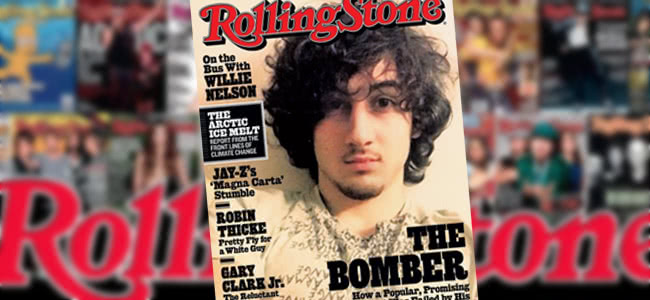Next month’s issue of Rolling Stone hasn’t even hit newsstands yet, but the August edition of the long running music magazine has caused a firestorm of controversy and discussion online for putting the Boston Bomber suspect Jahar Tsarnaev on its cover.
Many criticising Rolling Stone for misusing and abusing the potent cultural currency of its cover – historically used to glamourise rock and pop stars – for glorifying a suspected terrorist.
The issue features a cover story by contributing editor Janet Reitman on Tsarnaev, spending two months with the terrorist suspect who last month pleaded “not guilty” to 30 charges related to the Boston Marathon bombing in April that injured over 260 people and killed three.
To help sell their in-depth piece on Tsarnaev, which Rolling Stone describes as “a riveting and heartbreaking account of how a charming kid with a bright future became a monster,” the music and news magazine made the decision to emblazon the suspect on its cover and almost as soon as they revealed their latest cover star, a torrent of negative reactions began storming in.
Popular internet site Buzzfeed were among the first to collate the accusations, featuring Think Progress editor-in-chief Judd Legum’s reaction that criticsed Rolling Stone for glorifying Tsarnaev as a modern day rock star.
New Rolling Stone cover turns the Boston bomber into Jim Morrison. A comparison: pic.twitter.com/UJKhAMJSGO
— Judd Legum (@JuddLegum) July 16, 2013
Twitter was set alight with bad press aimed in Rolling Stone‘s direction, one commenter saying: “Ridiculously irresponsible, tacky as FUCK, and 100% disrespectful to victims and their families.” While Facebook users were equally aghast at the Boston Bomber cover star, drawing over 9,000 (mainly vitriolic) comments, one stating: “I think it’s wrong to make celebrities out of these people. Why give the guy the cover of Rolling Stone?”
A Facebook group calling for a boycott of the Rolling Stone issue has also sprung up overnight, already attracting 102,000 likes and steadily growing.
As FasterLouder points out, David Draiman – frontman for metal band Disturbed – wrote a long acerbic thought piece to his 10 million+ fan base about the Janar Tsarnaev cover. “Rolling Stone has become less and less about music, and has become more and more about bullshit, pop culture nonsense,” writes the vocalist. “Are you out of your ultra-liberal, sympathetic to a fault, fucking minds,” he calls to the editors; “The next terrorist/murdering incident, be it another bomber, or a madman with an assault rifle, unleashing fire upon a school full of children, is on you.”
Amidst the ongoing fallout Gawker reports that American pharmacy chain CVS will not be stocking the August 2013 issue, issuing a statement explaining the Rolling Stone boycott:
CVS/pharmacy has decided not to sell the current issue of Rolling Stone featuring a cover photo of the Boston Marathon bombing suspect. As a company with deep roots in New England and a strong presence in Boston, we believe this is the right decision out of respect for the victims of the attack and their loved ones.
New England convenience store chain Tedeschi Food Shops has also banned the upcoming issue, stating it “cannot support actions that serve to glorify the evil actions of anyone… music and terrorism don’t mix!”
The Boston Herald has also published a letter from Boston Mayor Thomas M. Menino addressed to Jann Wenner, Rolling Stone’s publisher, slamming them for “[Rewarding] a terrorist with celebrity treatment. It is ill-conceived, at best, and re-affirms a terrible message that destruction gains fame for killers and their ‘causes’.” The Mayor adding that “the survivors of the Boston attacks deserve Rolling Stone cover stories, though I no longer fell that Rolling Stone deserves them.”
Rolling Stone editors eventually issued a public statement early this morning justifying their Boston Bomber story as an act of hard-nosed journalism, while conveniently dodging the issue of placing Tsarnaev on the cover. The statement reads:
Our hearts go out to the victims of the Boston Marathon bombing, and our thoughts are always with them and their families. The cover story we are publishing this week falls within the traditions of journalism and Rolling Stone’s long-standing commitment to serious and thoughtful coverage of the most important political and cultural issues of our day. The fact that Dzhokhar Tsarnaev is young, and in the same age group as many of our readers, makes it all the more important for us to examine the complexities of this issue and gain a more complete understanding of how a tragedy like this happens. –THE EDITORS.”




































